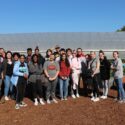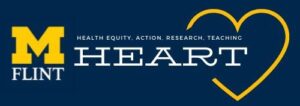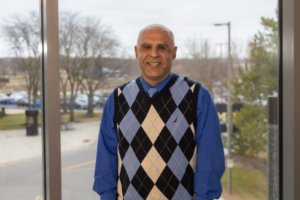In January 2020, the Mellon Foundation made a $600,000 award to University of Michigan – Flint professors Daniel Birchok and Jacob Lederman, just before the emergence of the COVID pandemic. The project, entitled ‘Borders and Crossings: Exploring Global Questions at the University of Michigan-Flint,’ began with the premise that community-engaged humanities courses needed to be more immersive. To address grand challenge questions like immigration, transnational literature and identities, and deindustrialization and the arts, students would participate in small cohort classes and explore how these themes were manifested regionally in Michigan and across the border in nearby Ontario. As the seriousness of the pandemic became clear, Birchok and Lederman pivoted away from cross-border travel to develop a series of humanities-oriented First Year Experience (FYE) classes focused on borders and identities within Michigan.

The Borders and Crossings project had bold ambitions. One ambition of the project is to immerse students in humanities experiences fully connected to community resources and identities. Another is to help the students see the global in the local. Further, it aims to make travel accessible to those who would have otherwise found it out of reach. In the process, these professors are directly impacting their students by raising levels of social awareness, student retention, and other measures of academic success. Eventually, as Covid concerns lessened, the project developers could re-introduce the originally planned cross-border travel.
Goals:
Borders & Crossings’ aims include:
- Community-engaged and globally-relevant topics
- Immersive experiences
- Small cohorts – Classes of 25 supported by two professors through the grant
- Humanities and humanistic social science approaches
- Perceptions of belonging
At present:
Thus far, 18 faculty members have participated in two Mellon Pedagogy Workshops that, among other things, help students to develop more accurate and complete narratives related to “grand challenge questions” tied to issues of justice, equity, and the human experience. “In these workshops, the faculty collaborated to develop 5 courses designed to pair an introduction to the resources, community, and culture on campus with immersive community-engaged experiences. Three classes have already begun; the fourth and fifth will debut in 2023.
The project integrates research around high-impact practices, especially the power of immersive experiences. Lederman said, “Immersive experiences prompt students to consider grand challenge questions and self-reflect on their place in the overall landscape of the region and the world.”
Birchok elaborates, “One of the things that Jacob and I are both pointing to when we’re connecting our own research to what we’re doing is that these are critical disciplines. They help us to think critically about the world. They help us to think about questions of value, questions of politics, and about what kind of world we want to build. And in that sense, they are different, not more important, but equally as important as more technical types of knowledge. You need both. You need to put the two together.” The faculty workshops helped provide a structure for how the classes can support the exploration of those questions.
Emma Davis, lecturer in dance and arts who participated in the workshop, will be team-teaching the ‘Dancing in the Streets’ class with Associate Professor of Political Science Jason Kosnoski. Their class will examine the politics of movement in public spaces. Davis said, “The Mellon workshop process informed the course design in addressing the crossing of several categories of ‘borders’ – spatial, temporal, and personal. First, it [i.e., Davis’ course] will lead the students to cross the border of their mind and body, themselves, and others. Then, it will help them to broach the border between the university and the community as they explore the parts of Flint that students rarely visit.” Ultimately, they will have facilitated all these border crossings by engaging in multiple forms of humanistic inquiry, such as dance and readings in history, philosophy, art, architecture, and research.
The Classes:
The classes all include comprehensive introductions to campus that make it clear to students that there are extensive resources on campus for students of all backgrounds to access and that everyone has unique individual needs as they navigate the undergraduate experience. The faculty teaching the classes have all been supported with the Mellon workshops to ensure that the students know how to appropriately advocate for themselves and their peers to access these resources and approach differences with an attitude of curiosity and learning that strengthens communal ties. They each offer different immersive experiences off campus.

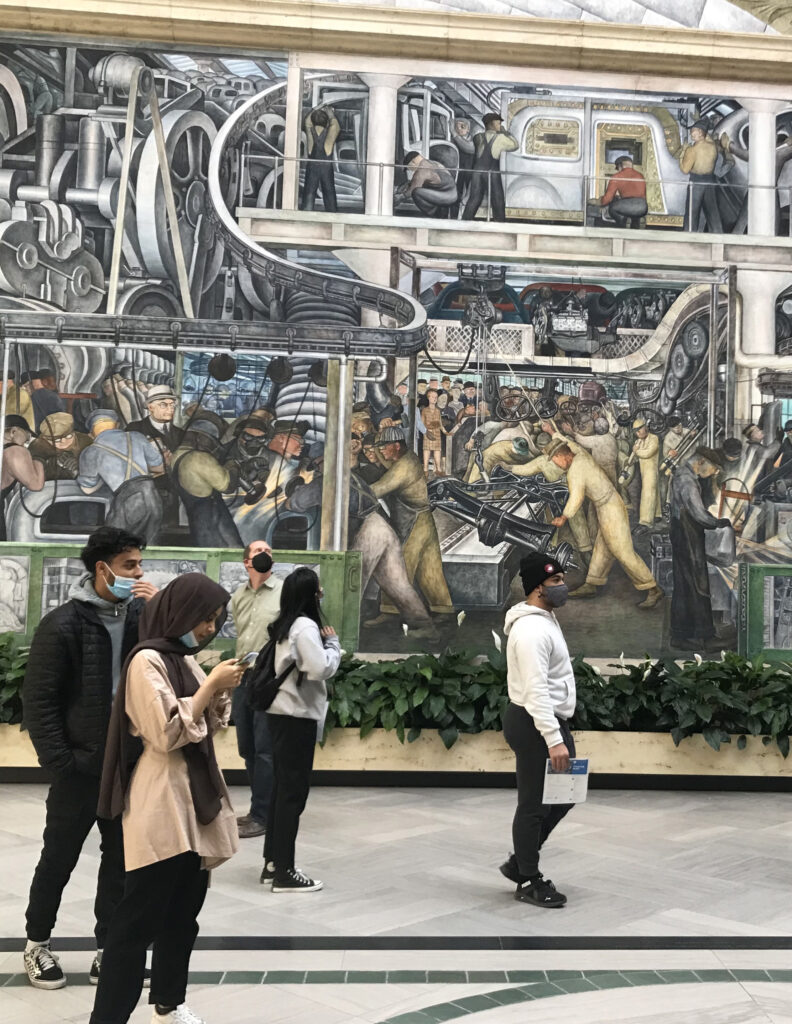


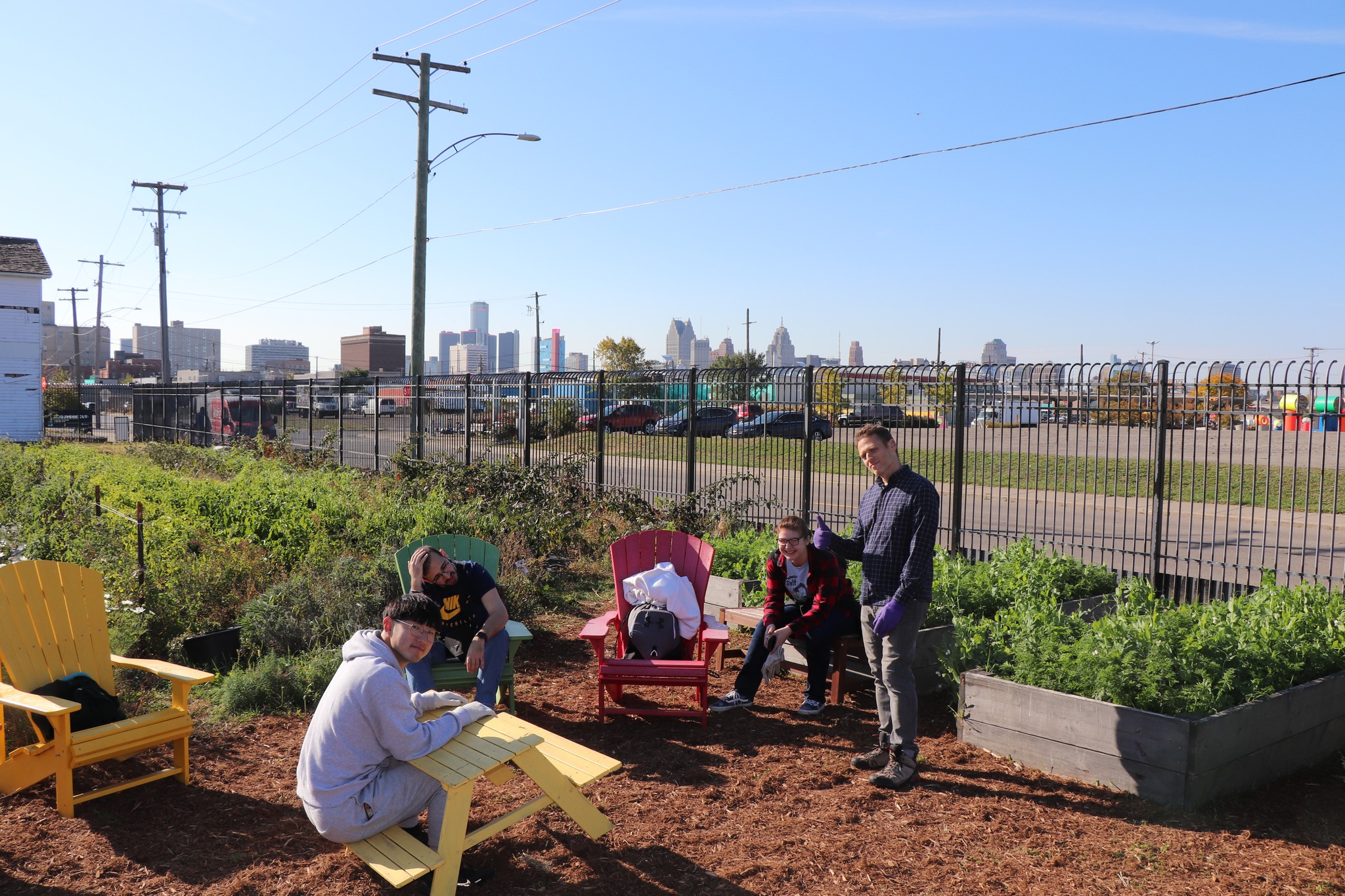
I need a passport for that? Globalization in SE Michigan and Ontario is taught by Birchok and Lederman, professors of anthropology and sociology, respectively. As a part of the class, Birchok and Lederman take the students to Detroit and Ontario to explore deindustrialization, globalization, immigration policy, redlining, and unionization. In addition, these students get the opportunity to meet with food justice activists, historians, and refugee advocates. They also engage with the UofM’s Detroit Center, a community-engaged space that hosts UM’s Semester in Detroit Program, in which students from UM-Flint are eligible to participate.
Anishinaabewakiing: Indigenous Michigan is a collaborative class taught by Vickie Larsen and Emily Feuerherm, professors of English partnered with the Saginaw Chippewa Tribal College. Together with Tribal College students, UM-Flint students are encouraged to think critically about the history and culture of indigenous Michigan. Through playing traditional Anishinaabe games and beading, the students can think about cross-cultural ways that play can be a legitimate aspect of learning.



Walking on Water is a class taught by Mary Jo Kietzman, professor of English. It explores Michigan waterways through the lens of indigenous peoples, early French and British commerce, and the effects of industrial and commercial uses of those resources. The class encourages students to discuss the relationship between the Flint River and the city’s water crisis. They also engage with literature inspired by the St. Clair River and its history. Finally, the students are encouraged to self-reflect on how they fit into this place and its history.


Dancing in the Streets will be taught by Emma Davis, lecturer of dance, and Jason Kosnoski, associate professor of political science. It will focus on the politics of movement and public space, focusing on two ‘border’ locales in Flint: Riverbank Park and Chevy Commons. “Using these techniques of “experimenting with experience” to highlight and question the many borders within these spaces, the course will culminate in a final group immersive experience,” Davis says. The final project will involve a public performance expressing the insights they gained as they examined the past, present, and future of these spaces in the context of 21st Century problems such as deindustrialization, segregation, and questions of community building and organizing.
Vehicles of Upheaval, taught by Ben Gaydos, professor of art, and Stephanie Gelderloos, lecturer of English, will explore the history and social impact of the automobile industry on communities in Michigan and the region. It will have a unique lens focused on race. Its culminating immersive experience will entail travel over Spring Break to several sites of interest to the intersection of African American and automotive history.
Findings:
Based on preliminary data collected by professors Birchok and Lederman, students self-report positive outcomes. These outcomes include increased knowledge of university and off-campus resources and opportunities. In addition, the students demonstrate an increased ability to form connections and network with other students and faculty mentors. They also say that these classes transformed their views of the humanities and social sciences and gave them an overall sense of being better prepared to take advantage of their college experience.
The project is integrating with the work of the Center for Global Engagement. As students take part in immersive experiences early in their college experience, they become more interested in and confident about participating in other such opportunities later-perhaps studying abroad or away or engaging in an internship that they might not have otherwise considered.
It is also integrating with research from the Persistence and Mattering in Undergraduate Education research cluster, which has contributed a body of scholarship around high-impact pedagogical practices like interdisciplinary approaches in General Education and immersive experiences that encourage self-reflection. This collaborative research also supports the Teagle Grant-funded CHILAS certificate initiative currently being implemented on campus.
Lederman said, “I had many students talk to me about how the course changed their understanding of careers. Some of them went into college seeking a degree path that matches up with a job, say engineer, and many of them came out still pursuing these kinds of degrees but also thinking more about how a double major can make them more marketable. Not only do these experiences expand your worldview as a human being, but they also allow them to see flexible kinds of career outcomes they could potentially aspire to.” These classes are making a massive difference for UM-Flint students and, in many ways, living up to Birchok and Lederman’s aspirations.

